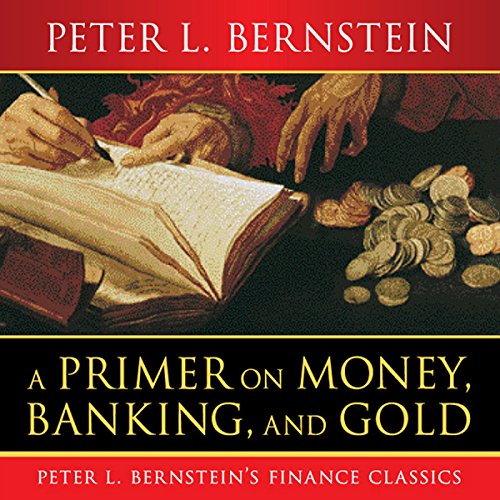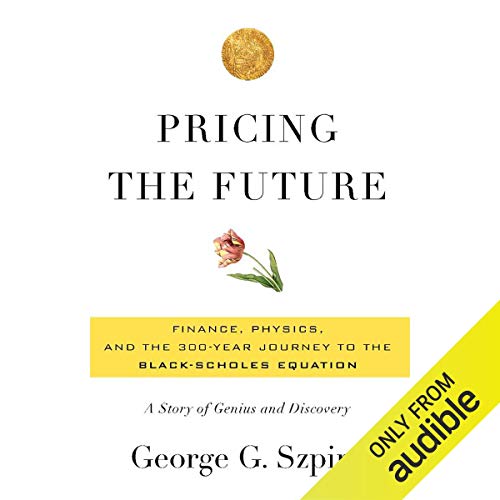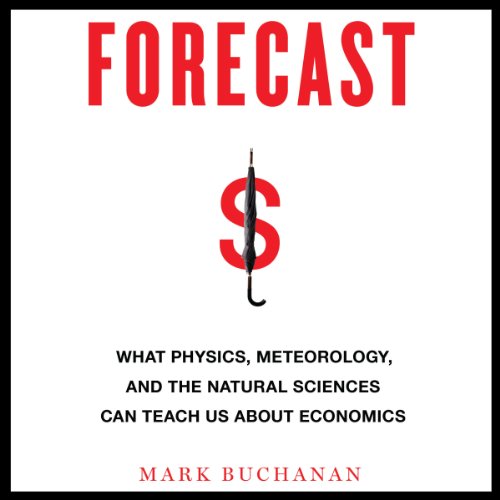
 Audible sample
Audible sample  Playing...
Playing... 
 Paused
Paused  Your audiobook is waiting!
Your audiobook is waiting!
Enjoy a free trial on us
$0.00$0.00
- Click above for unlimited listening to select audiobooks, Audible Originals, and podcasts.
- One credit a month to pick any title from our entire premium selection — yours to keep (you'll use your first credit now).
- You will get an email reminder before your trial ends.
- $14.95$14.95 a month after 30 days. Cancel online anytime.
Buy
-13% $21.83$21.83
Against the Gods: The Remarkable Story of Risk
 Audible Audiobook
– Unabridged
Audible Audiobook
– Unabridged
A Business Week, New York Times Business, and USA Today Best Seller
In this unique exploration of the role of risk in our society, Peter Bernstein argues that the notion of bringing risk under control is one of the central ideas that distinguishes modern times from the distant past. Against the Gods chronicles the remarkable intellectual adventure that liberated humanity from oracles and soothsayers by means of the powerful tools of risk management that are available to us today. This brand new audio edition of Bernstein's classic work is masterfully narrated by Mike Fraser.
PLEASE NOTE: When you purchase this title, the accompanying PDF will be available in your Audible Library along with the audio.
- Listening Length14 hours and 27 minutes
- Audible release dateApril 28, 2021
- LanguageEnglish
- ASINB093DYSKHQ
- VersionUnabridged
- Program TypeAudiobook
People who viewed this also viewed
- Audible Audiobook
- Audible Audiobook
- Audible Audiobook
- Audible Audiobook
- Audible Audiobook
People who bought this also bought
- Audible Audiobook
- Audible Audiobook
- 100 to 1 in the Stock Market: A Distinguished Security Analyst Tells How to Make More of Your Investment Opportunities
 Audible Audiobook
Audible Audiobook - Audible Audiobook
- Audible Audiobook
Related to this topic
- Audible Audiobook
- Audible Audiobook
- Audible Audiobook
- Audible Audiobook
- Warren Buffett's Ground Rules: Words of Wisdom from the Partnership Letters of the World's Greatest Investor
 Audible Audiobook
Audible Audiobook
Product details
| Listening Length | 14 hours and 27 minutes |
|---|---|
| Author | Peter L. Bernstein |
| Narrator | Mike Fraser |
| Audible.com Release Date | April 28, 2021 |
| Publisher | Echo Point Books & Media, LLC |
| Program Type | Audiobook |
| Version | Unabridged |
| Language | English |
| ASIN | B093DYSKHQ |
| Best Sellers Rank | #12,347 in Audible Books & Originals (See Top 100 in Audible Books & Originals) #2 in Risk Management (Books) #4 in Insurance (Audible Books & Originals) #7 in Financial Risk Management (Books) |
Customer reviews
Customer Reviews, including Product Star Ratings help customers to learn more about the product and decide whether it is the right product for them.
To calculate the overall star rating and percentage breakdown by star, we don’t use a simple average. Instead, our system considers things like how recent a review is and if the reviewer bought the item on Amazon. It also analyzed reviews to verify trustworthiness.
Learn more how customers reviews work on AmazonReviews with images
-
Top reviews
Top reviews from the United States
There was a problem filtering reviews right now. Please try again later.
presented in "Against the Gods." From the abacus to rolling dice,
annuities, insurance industry origins, explorations, gambling,
military tactics, scientific research, to investing, and more. In
most things in life big and small, there is some element of risk is
involved. This book presents Risk, and how our civilization has
utilized it - and needed it - to evolve to where it is today.
Individuals and groups don't take a risk with the expectation that it
will fail (although there's awareness that failure is a possibility).
The *expectation* is not of failure.
Peter Bernstein made this topic fun and informative for those of us
that are 'non-numerically oriented.' Actually, the concept of risk
involves a lot of non-mathematical and statistical concepts.
The writing style and chapter titles are hip: "The Winds of the
Greeks and the Roll of the Dice, The Renaissance Gambler, The Measure
of Our Ignorance, The Man Who Counted Everything Except Calories, The
Failure of Invariance," and "Awaiting the Wildness," for example.
The modern and Western concept of risk began with the Hindu-Arabic
numbering system that arrived in the West about 700 years ago. The
more in-depth examination of risk truly began during the Renaissance,
resulting in exploration an the exploitation of resources.
In Chapter 10, "Pea pods and Perils," Bernstein emphasizes the
rock-solid concept of "Regression to the Mean" (RoM). This is true
especially concerning the historical trends and patterns of the
financial markets. Yet, he notes how difficult the Predictable
Regression of the Mean is for humans to plan with RoM, and around it.
There are three reasons why humans have trouble using the RoM in
decision-making: 1) It proceeds so slow that a 'shock' will disrupt
the process, 2) When the RoM is reached, as it is periodically
people don't recognize it and hover on either side of the mean, and
3) The old mean may be unsustainable, meaning the old Mean is being
replaced by a new Mean. But....there still is....a Mean.
Bernstein states on page 173:
"If you bet that today's normality will extend indefinitely into the
future, you will get rich sooner and face a smaller risk of going
broke than if you run with the crowd."
This strategy seems oriented for the long-term growth oriented crowd.
We witnessed the sheep and lemmings in the late 1990s that
jumped onto the Tech Bubble Wagon, only to get burned badly by not
getting off in time. (Or perhaps, the sheep got out in time, but the
lemmings didn't.) Some similarities In 2007 with the Real Estate SFH
housing and condo speculation, flipping, and sub-prime mortgage and
ARM market, currently.
A certain percentage of the human population are basically, lemmings.
Bernstein spent some time on Jacob Bernoulli. Bernoulli's notion of
"satisfaction resulting from any small increase in wealth will be
inversely proportionate to the quantity of good previously
possessed." And perhaps this is why King Midus was an unhappy man.
What are the consequences of excluding, avoiding, or making risk
illegal? In modern times, when the Soviets tried to administer
uncertainty out of existence through the government fiat and
planning, they choked off social and economic progress. Communism is
contrary to human nature. But much of it was that communism took
away the concept of risk.
Risky Businesses, or business involving risk: the insurance industry
actually goes back to the Code of Hammurabi in 1800 BC. Called
"Bottomry," the owner of the ship would take out a loan to finance a
ship's voyage. No premiums were every paid but if the ship was lost,
the loan didn't have to be repaid.
The concept of life insurance basically began in Greece and Rome. In
the Middle Ages, the growth in trade spurred the insurance and
finance industries in Western Europe.
Tons of info. on common things we usually don't think of know much
about, that you can further delve into: The American game of "craps"
came to Europe via the Crusades. The mathematical invention of the
"0" and the abacus which still is in our roots. The Abacus is the
oldest counting instrument in our history. The word "Abacus" comes
from the Greek word for "sand" and "calculate" comes from the Latin
word for pebble, "calculus."
John Von Neumann invented Game Theory. Defeat is highly likely of
you play to win rather than avoid losing. True in everyday business.
There are benefits to cooperation, that produces two winners or
semi-winners rather than on loser and one winner.
A great book. If you read it, I think the odds are that that you'll
like it. :)
The author however seems not to be aware of the notion of 'model risk' that is embedded in modern approaches to risk management and financial engineering. This is apparent when he speaks of the inability of risk analysts to input concepts into computing machines that they themselves cannot conceive. The issue for risk management is not whether these concepts are exact representations or reality, but rather the cost or risk associated with their inaccuracy. In addition, risk analysts do not need to conceptualize on a level that is extremely far from current paradigms. They need not think the 'unthinkable" as the author believes that they do. Instead, their goal is to invent concepts, models or even new paradigms that allow risk managers to make estimates based on these concepts. But these managers do not view these models as sacrosanct, or as "oracles" as the author puts it. In fact there is typically a large amount of skepticism exhibited towards the models, and the managers at time do resort to personal intuitions and hunches.
The author though is correct in his opinion of the huge role of machines in risk management and in finance in general. With each passing day these machines are given more responsibility for doing financial analysis, forecasting, trading, and even model building. And more importantly, they are beginning to actually construct concepts and theories about how markets work, with the guidance for the time being of human experts. This trend will continue, and with faster and faster machines on the horizon, and with more trust placed in these machines, one can expect even more volatility in the financial markets. This volatility will require even smarter machines to deal with the huge risk trade-offs that will be involved, and it is likely that the machines will compete fiercely with each other as the strive to optimize the financial health of the firms that deploy them.
Thus there are very challenging times ahead for risk management, and therefore it is important to keep its role in proper context. It is not done for the sake of it, and it depends on conceptions and theories that were developed centuries ago, as the author of this book shows in great detail. It is wise to keep in mind these historical origins to the same degree that risk algorithms depend on historical data. Risk in the twenty-first century will dwarf anything that has come before, and new political ideologies. legal and regulatory frameworks, and systems of ethics will arise just to deal with its complexity. The degree to which humans are overwhelmed by this risk will be inversely proportional to their willingness to learn from history as well as depart from it, and to interact with the most complex technology ever constructed.





















